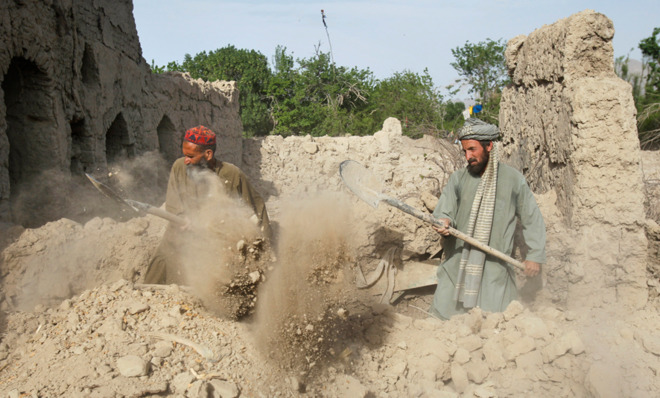How one inspector general is fighting fraud and waste in Afghanistan
John Sopko has done his job so well it's hard to believe he's been allowed to keep it


A free daily email with the biggest news stories of the day – and the best features from TheWeek.com
You are now subscribed
Your newsletter sign-up was successful
After 12 years of war, you would think the war planners and defense contractors have the situation in Afghanistan well in hand. And they do, if the goal is wasteful spending on such a colossal scale that it makes Healthcare.gov look like Amazon.com.
The magnitude of the ongoing fiscal irresponsibility in Afghanistan is almost impossible to measure, and there is little hope that either the White House or Congress will show any interest in listening to those who provide the warm bodies and sweaty dollars for the ongoing conflict. The president, who has bragged that he is "very good at killing people," certainly doesn't want to stop doing the one thing he's been good at of late. And while the Democrats continue running interference for their standard-bearer, Republicans in Congress steadfastly refuse to show spine in overseeing the president for fear that they accidentally end the war. No one wants that — things are going so well!
There is one oversight mechanism in place in Afghanistan that has been enormously effective in uncovering egregious irresponsibility on the part of the Departments of State and Defense, as well as international aid offices and the Afghan National Army and government. The Office of the Special Inspector General for Afghanistan Reconstruction (SIGAR) is an independent body designed to peek around at the $96.57 billion dollars appropriated thus far to Afghanistan's reconstruction. This is more than spreadsheet scrutiny (though they do check the numbers with insane precision); auditors are deployed across Afghanistan to see with their own eyes what's going on, and report their findings back to Washington. The present SIGAR is John Sopko, who does his job so well that it's hard to believe he's been allowed to keep it.
The Week
Escape your echo chamber. Get the facts behind the news, plus analysis from multiple perspectives.

Sign up for The Week's Free Newsletters
From our morning news briefing to a weekly Good News Newsletter, get the best of The Week delivered directly to your inbox.
From our morning news briefing to a weekly Good News Newsletter, get the best of The Week delivered directly to your inbox.
What have they discovered? To choose from only recent findings, the office reported last month that the Combined Security Transition Command-Afghanistan — the group in charge of training and developing the Afghan security forces — couldn't account for $230 million in spare parts it had ordered. Meanwhile, another $130 million parts were ordered without anyone knowing if the parts were on-hand or not. As it turns out, the Afghan National Army isn't keeping accurate records of which parts it has in stock, and because the spigot in Washington blasts money as though it were through a fire hose, whenever they need a new part, they just order it and send you the bill. [Full report: PDF]
In a different release, the SIGAR reported that in at least one case, you were paying $500/gallon for diesel fuel. (The market price cap for diesel in Afghanistan is $5/gallon.) You might be surprised to learn that Sayed Bilal Sadath Construction Company, the contractor who received the $300,000 overpayment, hasn't sent it back. And why would they? They were paid $200,000 for thermostats only worth $2,000, and nobody complained. But here's my favorite part. Sayed Bilal Sadath Construction Company received this money for a contract to build a small, 100-bed hospital in Gardez, Afghanistan — an unfinished hospital that is almost two years behind schedule. Don't worry about it, though. The Afghan government has warned that it might not be able to use the hospital anyway, as its operation and maintenance costs are five times more than the hospital it's supposed to replace. [Full report: PDF]
All of this would be terrific news — not the fraud and waste, but the highly effective crusader charged with finding it — if not for one insurmountable obstacle: Security in Afghanistan is abysmal. The "graveyard of empires" is a dangerous place, and Sopko's brave men and women are limited to what are called "oversight bubbles" — places where security can be provided and emergency medical care dispatched. By next year, SIGAR predicts it will only have access to 21 percent of the country. This is very good news if you are the Afghan National Army, diving like Scrooge McDuck into a money bin of our creation. Likewise for government contractors who've made a habit of taking the money and running.
On October 10, Sopko sent an urgent letter to the Secretaries of Defense and State, as well as the administrator at U.S. Agency for International Development, asking for guidance and support in expanding oversight to the other 79 percent of Afghanistan. (In northern Afghanistan alone, there are ongoing infrastructure projects worth $72 million that lack oversight.) Sopko requested a response in 30 days. Forty-one days later, none of the three men have issued a response and have each asked for more time. The only response of merit has been from Sen. Claire McCaskill (D-MO), who as a result of Sopko's letter has submitted an amendment to the National Defense Authorization Act for Fiscal Year 2014. Her amendment, SA 2196, would withhold funds from any project or program in Afghanistan that cannot be physically accessed by government oversight authorities. [Full letter: PDF]
A free daily email with the biggest news stories of the day – and the best features from TheWeek.com
It is a proposal whose passage is needed without delay, if only because as the security situation continues to degrade in Afghanistan, that 21 percent oversight bubble is an optimistic appraisal, according to State Department officials. This degradation of security, for what it's worth, comes in spite of a twelve-year war with no end in sight and no discernable strategy (or even definition) for "success." And of course, enough American tax dollars to fill Panjshir Valley.
David W. Brown is coauthor of Deep State (John Wiley & Sons, 2013) and The Command (Wiley, 2012). He is a regular contributor to TheWeek.com, Vox, The Atlantic, and mental_floss. He can be found online here.
-
 The ‘ravenous’ demand for Cornish minerals
The ‘ravenous’ demand for Cornish mineralsUnder the Radar Growing need for critical minerals to power tech has intensified ‘appetite’ for lithium, which could be a ‘huge boon’ for local economy
-
 Why are election experts taking Trump’s midterm threats seriously?
Why are election experts taking Trump’s midterm threats seriously?IN THE SPOTLIGHT As the president muses about polling place deployments and a centralized electoral system aimed at one-party control, lawmakers are taking this administration at its word
-
 ‘Restaurateurs have become millionaires’
‘Restaurateurs have become millionaires’Instant Opinion Opinion, comment and editorials of the day
